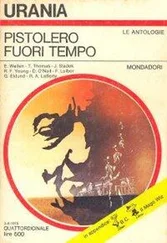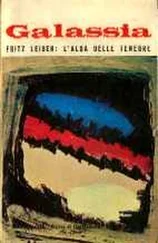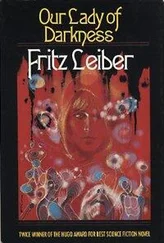When in the course of the putting-to-bed ritual on the second or third (or maybe fourth) night of their visit Wolf knelt to switch on the thing, Tommy said, “Don’t do that, Pa. I don’t want it tonight.”
Wolf looked up at his tucked-in son questioningly.
Terri had a thought based on her own unspoken feeling about the light. “Don’t you like the colors, Tommy?” she asked. “Wolf, there’s a plug-in fixture like this one, only with milky white glass, under that strange old painting of your mother in the living room. I’m sure your father wouldn’t mind if we changed—”
“No, don’t do that,” Tommy interrupted. “I don’t mind these colors at all, Ma, really. I just don’t want a light tonight.”
“Should I take this one away?” Wolf asked.
“No, don’t do that, Pa, please. Leave it there, but don’t turn it on. But leave the door to the hall open a little.”
“Right,” his father affirmed vigorously.
When good-night kisses were done and they were safely beyond Tommy’s hearing, Wolf said, “I guess Tom’s decided he’s too grown up to need a light to sleep by.”
“Maybe. Yes, I guess so,” Terri agreed somewhat reluctantly. “But I’m glad it’s off, anyhow. Loni said it gave the room a corpse look, and I thought so too.” Loni Mills was Terri Kruger’s attractive younger sister. She’d come with them on their visit to meet Wolf’s father, but had decided the day before that she needed to get back to campus a couple of days before winter vacation ended at the Oregon college where she was a sophomore.
Terri added, frowning, “But why did he make a thing of your not taking the fixture away?”
“Obvious.” Wolf grinned. “Little guy’s keeping his options open. So if he should get scared, it’s there to turn on. Good thinking. Also shows the colors don’t bother him. Why’d Loni think of blue and green as corpse colors, I wonder?”
“You’ve seen a fresh drowned person, haven’t you?” Terri responded lightly. “But why don’t you ask Cassius that one? It’s the sort of question gets him talking.”
“Right,” Wolf agreed without rancor. “Maybe I will.”
And true enough, there’d been a couple of times during the visit (though not as many as Wolf had feared) when conversation had languished and they’d been grateful for any topic that would get it going again, such as oddities of psychology, Cassius’ academic field, or ghost stories, in which they all seemed to share an interest. Matter of fact, the visit was for Wolf one of ultimate reconciliation with his father after a near-separation from both parents for a period of twenty years or so, while Terri was meeting her father-in-law, and Tommy his grandfather, for the first time.
The background for this was simply that the marriage of Wolf’s father and mother, Cassius Kruger and Helen Hostelford, had progressively become, after Wolf’s early childhood, a more and more unhappy, desperately quarrelsome, and alcoholic one, full of long, cold estrangements and fleeting reconciliations, yet neither partner had had the gumption to break it off and try something else. At the earliest teen age possible, Wolf (it was short for Wolfram, a fancy of his father) had wisely separated himself from them and largely gone it on his own, getting a degree in biology and working up a career in veterinary medicine and animal management, feeling his way through an unsuccessful early marriage and several living arrangements, until he’d met Terri. His mother’s death several years back from a mixture of alcohol and barbiturate sleeping pills hadn’t improved his relationship with his father—the opposite, rather, since he’d been somewhat closer to Helen and inclined to side with her in the unutterably wearisome marriage war—but then the old man, whom he’d expected to go downhill fast once he was alone, had surprised him by pulling out of his alcoholism (which had again and again threatened to end his academic career, another wearisomely repetitive series of crises) by the expedient of quitting drinking entirely and slowly rebuilding the wreckage of his body into at least a fairly good semblance of health.
Wolf had been able to keep tabs on his father’s progress through letters he got from an old crony of his mother, a gossipy and humorous theatrical widow named Matilda “Tilly” Hoyt, who was also a Marin resident not far from Goodland Valley and kept in touch with the old man after Helen’s death; and from infrequent, cold-bloodedly short hello-good-bye solo visits he paid Cassius to check up on him that came from a dim unwilling feeling of responsibility and from an incredulous and almost equally unwilling feeling of hope.
After several years, his father’s repeated good showings, his own reawakening good memories from early childhood before the marriage war had started, the old man’s seemingly sincere, even enthusiastic, interest in Wolf’s profession and all his son’s life, for that matter, plus some encouragement from Terri, worked a perhaps inevitable change in Wolf. He talked more with Cassius on his solo visits and found it good, and he began to think seriously of accepting the old man’s repeated invitation to bring the new family to visit.
He talked it over first with Tilly Hoyt, though, calling on her at her sunny cottage nearer the beach and the thundering, chill, swift-currented Pacific than the treacherous brown hills which rains could rumble.
“Oh, yes, he’s changed, all right,” she assured Wolf, “and as far as the liquor goes, I don’t think he’s had a drop since two or three months after Helen died. He’s got some guilt there, I think, which showed in odd ways after she died, like his bringing down from the attic that weird painting of her by that crazy French-Canadian—or was it Spanish-Mexican?—painter they used to have around.” She searched Wolf’s eyes unhappily, saying, “Cassius was pretty rough with Helen when he got very drunk, but I guess you know about that.”
Wolf nodded darkly.
She went on, “God knows I got my share of black eyes from Pat when he was still around, the bum.” She grimaced. “But I gave as good as I got, I sincerely hope, and somehow though we were fighting all the time, we were always making up a little more of the time. But with Helen and Cassius anything like that seemed to cut deeper, down to the bone, take longer to heal, they were both such nice, idealistic, goofy, perfectionist people in their ways, couldn’t accept the violence that was in them. And the fault wasn’t always on Cassius’ side. Your mother wasn’t the easiest person to get on with; she had a bitter streak, a cold-as-death witch thing, but I guess you know that too. Anyway, now Cassius is, well, what you might call… chastened.” She curled her lip in humorous distaste at the word and went on briskly, “I know he wants to meet your new family, Wolf. Whenever I see him he talks a lot about Tommy—he’s proud as anything to be a grandfather, and about Terri too, even Loni—he’s always showing me their pictures—and he positively makes a hero of you.”
So Wolf had accepted his father’s invitation for himself and Terri and Tom and Loni, and everything had seemed to work out fine from the start. The days were spent in outings around the Bay, both north and south of the Golden Gate and east into the Napa wine country and Berkeley-Oakland, outings in which Cassius rarely joined and Wolf enjoyed playing tour guide, the evenings in talking about them and catching up on the lost years and comfortably growing a little closer. The old man had spread himself and not only had his cavernous place cleaned up but also had the Latino couple, the Martinezes, who looked after it part time, stay extra hours and cook dinners. In addition he had a couple of neighbors over from time to time, while Tilly was an almost constant dinner guest, and he insisted on serving liquor while not partaking of it himself, though he did nothing to call attention to the latter. This so touched Wolf that he hadn’t the heart to say anything about his father’s almost constant cigarette smoking, though the old man’s occasional emphysemic coughing fits worried him. But the other old people smoked too, Tilly especially, and on the whole everything went so well that neither Loni’s premature departure nor the occasional silences that fell on their host cast much of a damper.
Читать дальше











